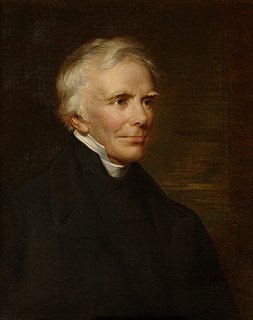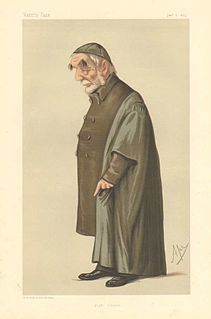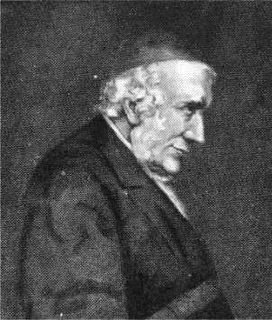
John Henry Newman was an English theologian and poet, first an Anglican priest and later a Roman Catholic priest and cardinal, who was an important and controversial figure in the religious history of England in the 19th century. He was known nationally by the mid-1830s, and was canonised as a saint in the Roman Catholic Church in 2019.

John Keble was an English churchman and poet, one of the leaders of the Oxford Movement. Keble College, Oxford, was named after him.

Edward Bouverie Pusey was an English churchman, for more than fifty years Regius Professor of Hebrew at the University of Oxford. He was one of the main promoters of the Oxford Movement.

Hugh James Rose (1795–1838) was an English Anglican priest and theologian who served as the second Principal of King's College, London.

Henry Edward Cardinal Manning was an English prelate of the Roman Catholic church, and the second Archbishop of Westminster from 1865 until his death in 1892.

The Oxford Movement was a movement of High Church members of the Church of England which eventually developed into Anglo-Catholicism. The movement, whose original devotees were mostly associated with the University of Oxford, argued for the reinstatement of some older Christian traditions of faith and their inclusion into Anglican liturgy and theology. They thought of Anglicanism as one of three branches of the "one holy, catholic, and apostolic" Christian church. By the 1840s many participants decided that the Anglican Church lacked grace, and converted to Roman Catholicism.
The Encyclopædia Metropolitana was an encyclopedic work published in London, from 1817 to 1845, by part publication. In all it came to quarto, 30 vols., having been issued in 59 parts.

Henry William Wilberforce, was a Church of England clergyman, a Tractarian, a convert to the Roman Catholic Church, and thereafter a newspaper proprietor, editor and journalist
Richard Hurrell Froude was an Anglican priest and an early leader of the Oxford Movement.

Martin Joseph RouthROWTH was an English classical scholar and President of Magdalen College, Oxford (1791–1854).

John Britton was an English antiquary, topographer, author and editor. He was a prolific populariser of the work of others, rather than an undertaker of original research. He is remembered as co-author of nine volumes in the series The Beauties of England and Wales (1801–1814); and as sole author of the Architectural Antiquities of Great Britain and Cathedral Antiquities of England.
William Rowe Lyall was an English churchman, Dean of Canterbury from 1845 to 1857.
The British Critic: A New Review was a quarterly publication, established in 1793 as a conservative and high-church review journal riding the tide of British reaction against the French Revolution. The headquarters was in London. The journal ended publication in 1826.
Charles Webb Le Bas was an English clergyman, fellow of Trinity College, Cambridge and principal of the East India Company College.
The Library of Anglo-Catholic Theology was a series of 19th-century editions of theological works by writers in the Church of England, devoted as the title suggests to significant Anglo-Catholic figures. It brought back into print a number of works from the 17th century, concentrating though not exclusively on the Caroline Divines. The publication of the Library, from 1841, was connected with the Oxford Movement which had begun in 1833; some of the editors, such as William John Copeland and Charles Crawley were clearly identified with the Movement. However the interests of the Library diverged early from those of the Tractarians. A total of 95 volumes by 20 writers was published over a dozen years; the plan, originally, had been to include 53 authors.

The Warburton Lectures are a series of theology lectures held in Lincoln’s Inn, London. They were established in 1768 with money given by William Warburton, and were intended to bring young divines to the notice of London audiences. The set topic was the proof of Christianity through prophecies.
John Rouse Bloxam (1807–1891) was an English academic and clergyman, the historian of Magdalen College, Oxford.
The Tracts for the Times were a series of 90 theological publications, varying in length from a few pages to book-length, produced by members of the English Oxford Movement, an Anglo-Catholic revival group, from 1833 to 1841. There were about a dozen authors, including Oxford Movement leaders John Keble, John Henry Newman and Edward Bouverie Pusey, with Newman taking the initiative in the series, and making the largest contribution. With the wide distribution associated with the tract form, and a price in pennies, the Tracts succeeded in drawing attention to the views of the Oxford Movement on points of doctrine, but also to its overall approach, to the extent that Tractarian became a synonym for supporter of the movement.
Albany James Christie was an English academic and Jesuit priest.